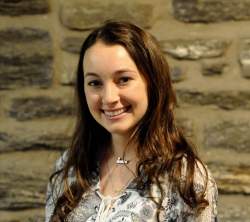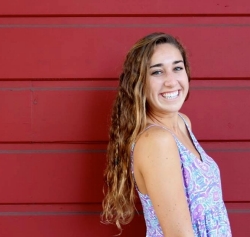Davis Scholars target risky teen behaviors and nutrition in elders receiving home care
This summer, research is once again being conducted by the College of Nursing’s Davis Undergraduate Summer Nursing Scholars. Senior Catherine DeLuca, mentored by Professor Elizabeth Dowdell, PhD, RN, FAAN, and Junior Carolyn Astrup, working with Professor Melissa O’Connor, PhD, MBA, RN, COS-C, are targeting their scholarly interests through the generosity of Hugh M. Davis ’83 MS, ’85 PhD; his wife, Pamela S. Davis; and their daughter, Olivia M. Davis ’13 BSN, who have established funds for undergraduate participation in faculty guided research.

Catherine’s qualitative study, “High School Students and Risk Taking Behaviors: Is there a Relationship between Health Risks and Online Risks” aims to expand nursing knowledge on the risky behaviors associated with high school students who send or receive sexting messages on their cell phones. Catherine notes the clinical impact, “Nursing assessment should reflect advancing technology and a rapidly changing social climate. To do this the nurse must understand common trends in today’s world and how these trends pertain to health and wellbeing of the modern patient. Understanding and applying the nursing process to Internet risk taking behaviors has significant clinical implications.”

Carolyn’s review of the literature, “Fuel for Life: A Literature Review of Nutrition among Older Adults Receiving Home Health” relates to the nutritional assessment and education for older adults receiving home health using a systematic search and critique of the literature. She describes her work in this way:
“There is a gap in knowledge when it comes to older adult’s nutrition in home health care, as the standard home health assessment does not contain information about a home health patient’s nutritional status. In the popular and empirical literature there is a plethora of knowledge on what older adults should be eating, and what health care professionals should do to help them do so, but it is unknown whether or not this information is being shared with older adults who are receiving home health, and whether or not older adults are truly getting the support they need to be consuming a nutritionally sufficient diet.”
